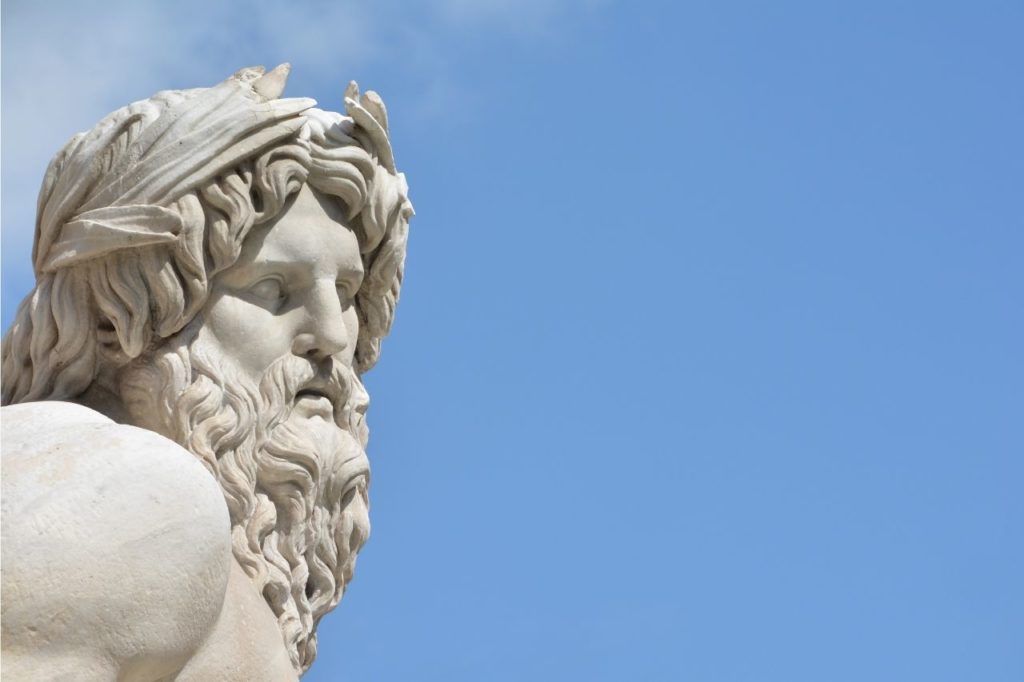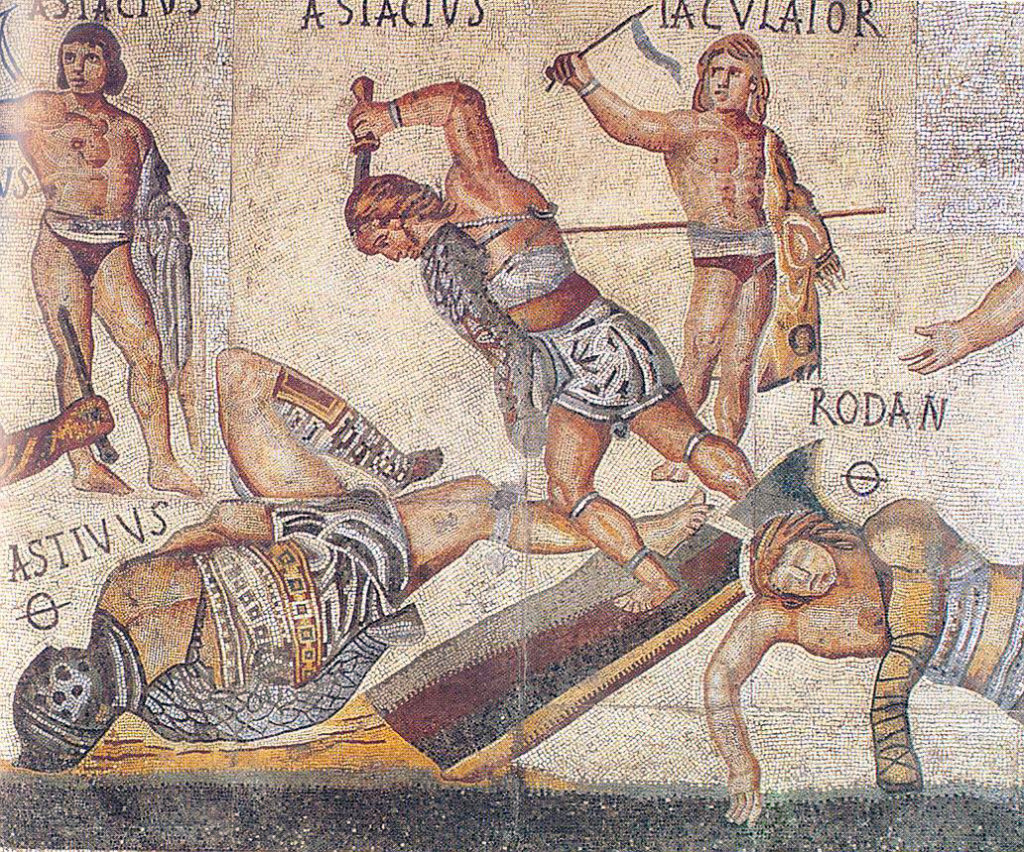Last updated on July 22nd, 2022 at 06:57 pm
While each culture has its own pantheon, the Ancient Greek gods are among the best known in the world today. This is because the Greek gods played an essential role in ancient Greece, shaping its history and encouraging its people toward excellence in every aspect of life. Whether for worshipping or asking for advice, the ancient Greeks had many gods that served different roles and functions. This article is all about diving into the names of the Ancient Greek gods, places where they lived, activities that they engaged in, symbols associated with them, similarities between them, and more!

Zeus
Zeus was the king of the gods and god of the sky, thunder, and weather and is still perhaps one of the most famed Greek gods to this day. After all, everyone’s heard of Zeus. In Greek mythology, he was the son of Cronus and Uranus, though the identity of his mother has been a source of debate.
He had several consorts, but his wife, Hera, was the most famous. He had numerous lovers, most notably Billia, Alcyone, and Galatea. He was also a frequent subject of erotic dreams and pederastic literature. Zeus was known as the “Shameless” because of his frequent and unrepentant carnal desires.
Zeus is a core figure in Greek Mythology, mainly due to his role as the leader of the Olympians, the main antagonists in the series of wars against the Titans. He is also a major figure in Greek Mythology due to his role as the father of many of the Olympian Gods. Zeus was very powerful and had many abilities. He could control lightning bolts, create thunder, and shoot lightning bolts from his eyes. He also had limited shape-shifting abilities (he could turn into a swan or a bull) and was able to teleport himself and others to any location at will.
His weapon of choice was a thunderbolt, which he hurled at others who displeased him or disobeyed his wishes. Zeus was also known for having several lovers, including Io, Danaë, Europa, Ganymede, Leda (who gave birth to Helen of Troy), Alcyone (who gave birth to Sarpedon), Galatea (who gave birth to Glaucus), and Callisto (who was turned into a bear by Artemis).
Hera
Hera was the goddess of women and marriage, queen of the gods. She was directly involved in many myths related to her conflicts with her brothers, Zeus and Poseidon. The myths and stories about Hera include the birth of her siblings and the origins of her role as queen of the gods.
Hera was known as the “queen of marriage” because of her critical role in weddings, though she was also known as a “queen of lovers” because of the many myths tell of her relationships with Zeus, the most famous being the love between Hera and Zeus which was expressed through many animals.
The stories of Hera’s love for Zeus can be interpreted in many different ways. One interpretation is that Hera longed for a deep, permanent relationship with Zeus, but he was not ready. In this interpretation, Hera’s love for Zeus was a longing for connection and permanence in an otherwise transient world.
Another interpretation of Hera’s love for Zeus is related to her desire for power. Hera saw in Zeus an opportunity for her to have power over him. In this interpretation, Hera’s love for Zeus was one of lust for power.
In Greek society, Hera would have been seen as a model wife. She was the one who kept the household running, and she was the one who got Zeus to return home to her, even if it meant tricking him into it. Hera was always there for her husband, sometimes even literally keeping him in line.
Hera’s role as a goddess of marriage and weddings is also important to look at when considering her role in Greek society. Hera’s presence at a wedding would have been seen as a blessing, and she would have been worshipped by all of those involved in the wedding ceremony.
This would have been especially true for brides and grooms on their wedding day because Hera was known as being “the protector of women,” which means that brides had special relationships with Hera because they were women. Women were considered important in Greek society because they gave birth to future generations, so it makes sense that brides had special relationships with Hera.
Aphrodite
Aphrodite was the goddess of love and beauty. As the goddess of beauty, she was also the patron of actors and the arts, complementing her role as the goddess of love. According to Greek mythology, Aphrodite was born from the foam of the sea, which was produced by Uranus’ castration.
She was the daughter of Zeus and Dione. Her many lovers included Ares, Adonis, Anchises, Anchises’ son, Oenone, Aeneas, and many others. Aphrodite is most famous for her role in the Trojan War. She was said to have been the first to incite the war when she told the handsome Trojan Aeneas to leave his wife, who was the daughter of the king of the city of Troy, and go to Greece to find a new wife.
Aphrodite played an important role in Greek culture as she would help those who honored her with love and beauty. She was frequently prayed to by those who wanted to fall in love, as well as those who wanted a beautiful spouse or lover.
Hades
Hades, Latinized as Aides or Aïdos, was the ancient Greek god of the underworld. He is a son of Cronus and Rhea and brother of Zeus. In ancient Greek Myths, Hades was the god who ruled the underworld, where the souls of the dead went after death. He was known as the “god of the underworld,” and it was believed that he was the first to be overcome with grief for the death of his wife, Persephone.
Hades was most often depicted in art as a hooded figure carrying a scythe. He was also thought to be the ruler of the dead and had many temples in which he was worshipped. The most famous of these was the Temple of Hades above the river Acheron in Thebes, Greece. This temple was dedicated to several different deities and was visited by many people.
People in Greek society would have prayed to Hades, the god of the underworld, if they wanted to be buried properly. If they did not get a proper burial when they died, it was thought that their spirits would never reach Hades and that they would remain wandering around on Earth for all eternity.
Ares (Mars)
Ares was the god of war in Greek mythology. He was the son of Zeus and Hera and the brother of Hebe, the goddess of youth. In the Iliad, he was portrayed as a bold and impulsive warrior who challenged many of the greatest heroes, including Hector and Achilles. He was also known as “Mars” in Latin, and this name was later used for the Roman god of war, who was also the son of Jupiter. The story of Ares and Aphrodite illustrates how the Greeks viewed the gods.
Ares was the god of war, violence, and conflict and also the god of sexual desire and jealousy. Aphrodite was the goddess of sexuality, beauty, and relationships, and she also had a connection to war. In Greek myths, it was often said that Aphrodite was called upon because she was the only god who could calm Ares down.
Whenever Greeks went to war, they sacrificed to Ares first because they believed that he was the one who would help them win. They believed that he would be able to help them defeat the enemy, but in return, they also had to pay him with a special gift. The gift was atonement for his part in the violence and death.
In some stories, Ares was portrayed as a god who was very aggressive and violent. He fought against other gods and heroes on their own land, and he was described as a god who would fight with any god or hero who challenged him. He would be very angry if he lost a battle, so it is not surprising that he often caused wars on Earth as well.
Since Ares was known as “Mars” in Latin because of his role as the Roman god of war, he also became known as the god of war in the Roman pantheon. The Romans also gave him a love for fighting, and he was known as the god of love, sex, and desire.
Artemis (Diana) and Apollo
Diana was the goddess of the moon, forests, and hunting. She was also the goddess of wild animals and the protector of the Roman army. Diana was often depicted as a young woman with a bow and arrow, driving off wild animals and frightening humans. Her Roman equivalent was known as Apollo. Apollo was known as the god of music, healing, and truth in Greek mythology. Although he was usually depicted as a young man, he was also thought to have been born from the egg of the goddess Leto after a group of snakes pursued her. In many myths, he was associated with the sun and the moon, representing order and chaos, respectively.
Athena
Athena was the goddess of wisdom and war in Ancient Greek mythology. Athena was often portrayed as a woman with a helmet on her head and a shield in her hand. She was associated with the moon and often carried a spear and wore a cloak. In Greek mythology, Athena was important because she was the goddess of war and peace. She was also a goddess of wisdom and learning and was known as the patroness of Athens. Every day people would pray to Athena to make them wise, and she was a protector of Athens.
Among her goddess powers, Athena was able to create useful items and craft objects. She was responsible for encouraging the creation of ships, chariots, and farming tools like plows and rakes. To many women, she was also responsible for guarding over and encouraging weaving, spinning, and pottery. If you wanted to be successful in your creative and productive efforts, Athena was the goddess to pray to.
Where did the Greek Gods Live?
Olympus was believed to be the home of the gods, and it was also thought that if you reached the top, you had become a god or goddess yourself. The mountain itself was said to be formed when Gaia, the earth goddess, threw a stone at her son Uranus, which caused his head to fall off. The mountain of Olympus was the home of many of the Greek gods.
The most famous of these was Zeus, the king of the gods, who lived on top of the mountain. Other gods who lived on the mountain included Hera, Poseidon, Heracles, and Athena. Other important gods from the Greek mythology that lived on Olympus include Zeus’ son, Hades, and the gods Athena, Artemis, and Hephaestus.
Olympus played a core role in Greek mythology, and consequently, it is a very important mountain in Greek culture. He was responsible for many things, including the creation of the world and many of its creatures. The gods on Olympus were responsible for many of the things that happened on Earth, so they were constantly fighting with each other because they disagreed about what to do.

